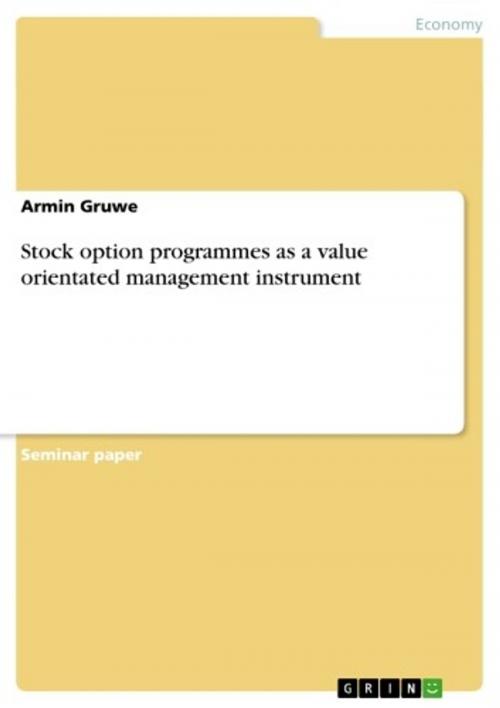Stock option programmes as a value orientated management instrument
Business & Finance, Management & Leadership, Management| Author: | Armin Gruwe | ISBN: | 9783638334105 |
| Publisher: | GRIN Publishing | Publication: | December 27, 2004 |
| Imprint: | GRIN Publishing | Language: | English |
| Author: | Armin Gruwe |
| ISBN: | 9783638334105 |
| Publisher: | GRIN Publishing |
| Publication: | December 27, 2004 |
| Imprint: | GRIN Publishing |
| Language: | English |
Seminar paper from the year 2004 in the subject Business economics - Business Management, Corporate Governance, grade: 1,3 (A-), Anhalt University of Applied Sciences (Master of Business Adminstration (HS-Anhalt)), course: Finance and Policy, 32 entries in the bibliography, language: English, abstract: Stock option programs (SOP) are known as a salary instrument for executives in companies. They are established in the United States and became popular in recent years also in Europe. This paper is concentrated on the use of stock option programs in German companies. Also it is only concentrated on stock option programs for the management as an incentive to increase the company performance. Stock option programs for employees became more common in the last year, but they are not part of this paper. Chapter 2 gives a definition of the agency theory and why incentives for the management are necessary. An overview over stock option programs is also given. Both definitions are essential for the rest of the analysis. Chapter 3 explains detailed the advantages and disadvantages of the stock option programs. It shows theory and what modifications are possible in the reality. Examples from different companies like Daimler-Chrysler, SAP AG and Google Incorporation. are included to support. Tax advantages through SOP and accounting rules that are connected with SOP are not part of this paper, because the focus is to show how the stock options program can be used as an incentive instrument for the management to increase the shareholder value. Chapter 4 describes an optimal model for SOP as far as it is possible to develop a program that is appropriate for different companies. In chapter 5 it is examined on the basis of the results of chapter 3 and 4 how appropriate the SOP of the company SAP AG is. Chapter 6 summaries the work and gives an outlook for the future development.
Seminar paper from the year 2004 in the subject Business economics - Business Management, Corporate Governance, grade: 1,3 (A-), Anhalt University of Applied Sciences (Master of Business Adminstration (HS-Anhalt)), course: Finance and Policy, 32 entries in the bibliography, language: English, abstract: Stock option programs (SOP) are known as a salary instrument for executives in companies. They are established in the United States and became popular in recent years also in Europe. This paper is concentrated on the use of stock option programs in German companies. Also it is only concentrated on stock option programs for the management as an incentive to increase the company performance. Stock option programs for employees became more common in the last year, but they are not part of this paper. Chapter 2 gives a definition of the agency theory and why incentives for the management are necessary. An overview over stock option programs is also given. Both definitions are essential for the rest of the analysis. Chapter 3 explains detailed the advantages and disadvantages of the stock option programs. It shows theory and what modifications are possible in the reality. Examples from different companies like Daimler-Chrysler, SAP AG and Google Incorporation. are included to support. Tax advantages through SOP and accounting rules that are connected with SOP are not part of this paper, because the focus is to show how the stock options program can be used as an incentive instrument for the management to increase the shareholder value. Chapter 4 describes an optimal model for SOP as far as it is possible to develop a program that is appropriate for different companies. In chapter 5 it is examined on the basis of the results of chapter 3 and 4 how appropriate the SOP of the company SAP AG is. Chapter 6 summaries the work and gives an outlook for the future development.















